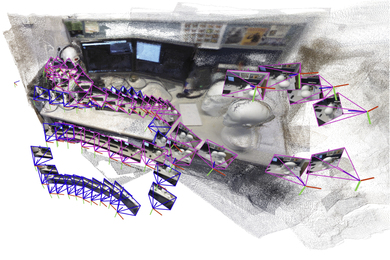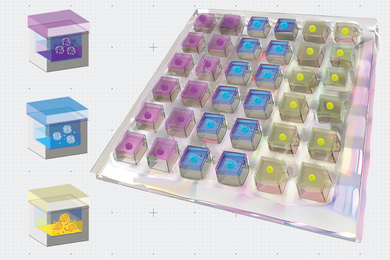Vivienne Sze, an associate professor of electrical engineering and computer science, was a member of the Joint Collaborative Team on Video Coding (JCT-VC), which developed the acclaimed High Efficiency Video Coding (HEVC) standard. For its work, the team received an Engineering Emmy Award during the Television Academy’s recent 69th Engineering Emmy Awards ceremony in Hollywood.
In a statement about the award, the Television Academy said HEVC “has enabled efficient delivery in ultra-high-definition (UHD) content over multiple distribution channels.”
“This new compression coding has been adopted, or selected for adoption, by all UHD television distribution channels, including terrestrial, satellite, cable, fiber, and wireless, as well as all UHD viewing devices, including traditional televisions, tablets, and mobile phones,” the Academy stated.
The JCT-VC’s award was one of seven Emmy's given to individuals, companies, or organizations for engineering innovations that significantly improve television transmission, recording, or reception.
“HEVC provides higher compression than previous standards,” says Sze, who also co-edited a 2014 book on the subject. “At the same time, it can operate at the high processing speed necessary for UHD video and at the low power consumption necessary for mobile devices. It was such an honor for the whole team to receive an Emmy from the Television Academy.”
The JCT-VC — which Sze describes as “a group of world-renowned video-coding experts” — consists of engineers from the Video Coding Experts Group (VCEG) of the International Telecommunication Union (ITU) and the Moving Pictures Expert Group (MPEG) of the International Organization for Standardization (ISO), as well as the International Electrotechnical Commission (IEC). She served as the primary coordinator of the team’s core experiment on coefficient scanning and coding, and chaired ad hoc groups on topics related to entropy coding and parallel processing.
Sze received a bachelor’s degree in electrical engineering from the University of Toronto and a master’s degree and PhD from MIT. During her PhD studies, she worked on the design of energy-efficient video-coding hardware under the guidance of Anantha Chandrakasan, now Vannevar Bush Professor of Electrical Engineering and Computer Science and dean of the School of Engineering.
She soon realized that the video-coding algorithms limited the amount of energy reduction that could be achieved by the hardware. Accordingly, she started to investigate ways to jointly design the algorithms and hardware to improve the energy efficiency of next-generation video coding systems. She published her results at the 2011 International Solid-State Circuit Conference (ISSCC).
Toward the end of Sze’s PhD work, she participated in VCEG meetings as the group was starting to discuss developing a new video-compression standard. After graduating, she joined the video coding team at Texas Instruments, which had sponsored her PhD research, and actively participated in the development of HEVC.
Once the HEVC standard was finalized, Sze joined the faculty of the Department of Electrical Engineering and Computer Science (EECS). She heads the Energy-Efficient Multimedia Systems Group at MIT’s Research Laboratory of Electronics (RLE). Her research involves applying the algorithm and hardware co-design approach to a broad set of applications including machine learning, computer vision, robotics, image processing and, of course, video coding. Recent results include energy-efficient algorithms and hardware for deep learning and autonomous navigation for miniature drones. She is also co-teaching a new class at MIT that focuses on the co-design of algorithms and hardware for deep learning.
Her work has earned numerous other awards and honors. She received the EECS Jin-Au Kong Outstanding Doctoral Thesis Prize in 2011 for her thesis on “Parallel Algorithms and Architectures for Low-Power Video Decoding." She also received the 2017 Qualcomm Faculty Award, the 2016 Google Faculty Research Award, the 2016 Air Force Office of Scientific Research Young Investigator Research Program Award, the 2016 3M Non-Tenured Faculty Award, the 2014 DARPA Young Faculty Award, and the 2007 Design Automation Conference/ISSCC Student Design Contest Award. She was also a co-recipient of the 2016 MICRO Top Picks Award and the 2008 Asian-SSCC Outstanding Design Award.








